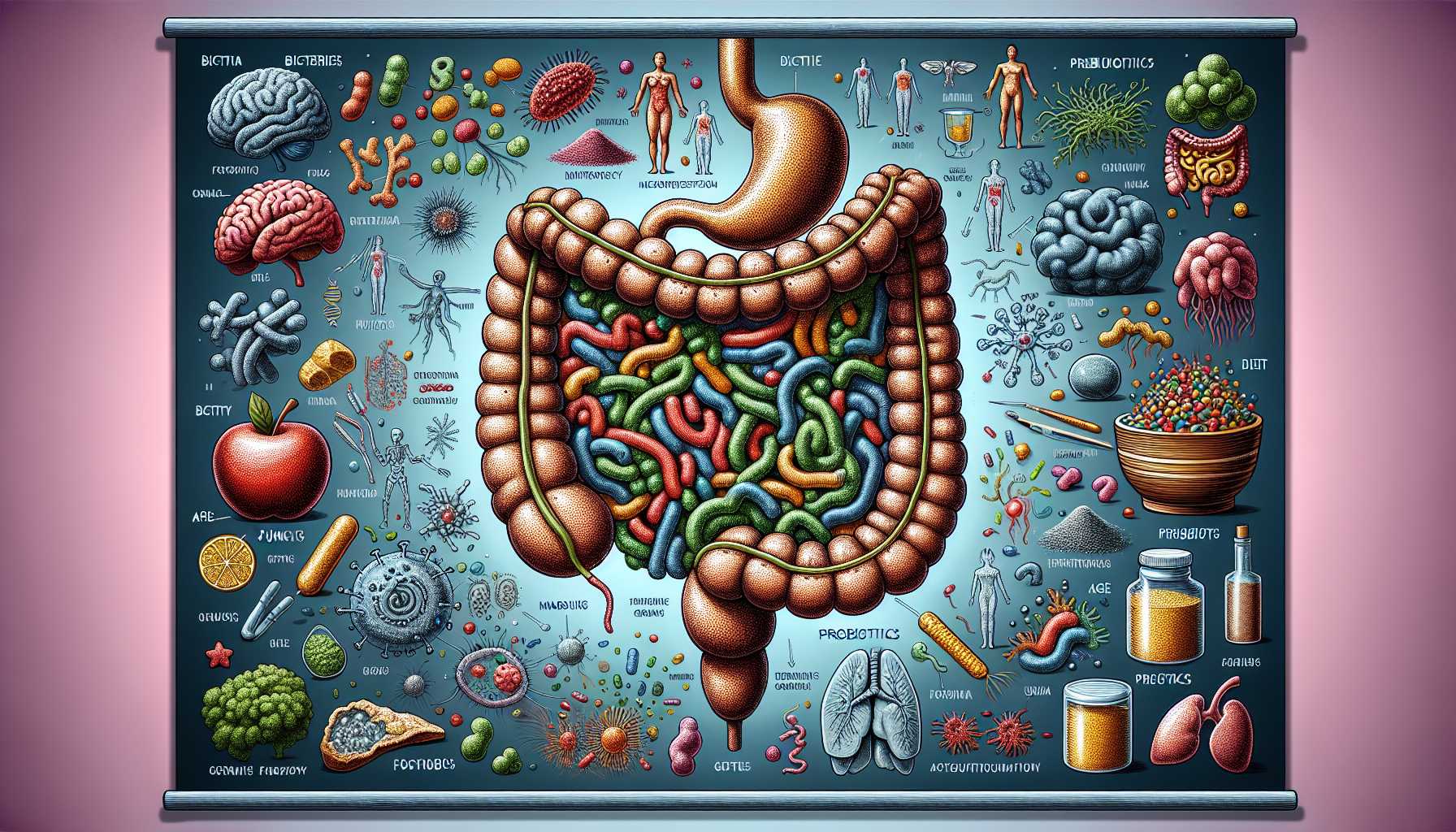
The gut microbiome refers to the trillions of microorganisms, including bacteria, viruses, fungi, and other microbes, that inhabit the gastrointestinal tract.
Chángdào wéishēngwù zǔ shì zhǐ jūzhù zài wèichángdào zhōng de shùwànqí wéishēngwù, bāokuò xìjūn, bìngdú, zhēnjūn hé qítā wéishēngwù.
肠道微生物组是指居住在胃肠道中的数万亿微生物,包括细菌、病毒、真菌和其他微生物。
These microbes play a crucial role in digestion, nutrient absorption, and overall health by influencing metabolism, immune function, and even mental health.
Zhèxiē wéishēngwù zài xiāohuà, yíngyǎng xīshōu hé zhěngtǐ jiànkāng zhōng fāhuī zhe zhìguān zhòngyào de zuòyòng, yǐngxiǎng zhe xīnchén dàixiè, miǎnyì gōngnéng, shènzhì yǐngxiǎng xīnlǐ jiànkāng.
这些微生物在消化、营养吸收和整体健康中发挥着至关重要的作用,影响着新陈代谢、免疫功能,甚至影响心理健康。
The composition of the gut microbiome varies among individuals and can be affected by factors such as diet, age, genetics, lifestyle, and the use of antibiotics.
Chángdào wéishēngwù zǔ de zǔchéng yīn gètǐ ér yì, shòudào yǐnshí, niánlíng, yíchuán, shēnghuó fāngshì yǐjí kàngshēngsù shǐyòng děng yīnsù de yǐngxiǎng.
肠道微生物组的组成因个体而异,受到饮食、年龄、遗传、生活方式以及抗生素使用等因素的影响。
A diverse and balanced gut microbiome is essential for maintaining good health, while an imbalance, known as dysbiosis, can lead to various health issues, including gastrointestinal disorders, obesity, and autoimmune diseases.
Duōyàng qiě pínghéng de chángdào wéishēngwù zǔ duìyú wéichí liánghǎo de jiànkāng zhìguān zhòngyào, ér bù pínghéng (chēng wèi wéishēngwù shītiáo) kěnéng dǎozhì gèzhǒng jiànkāng wèntí, bāokuò wèicháng jíbìng, féipàng hé zìshēn miǎnyì xìng jíbìng.
多样且平衡的肠道微生物组对于维持良好的健康至关重要,而不平衡(称为微生物失调)可能导致各种健康问题,包括胃肠疾病、肥胖和自身免疫性疾病。
Research suggests that a diet rich in fiber, fruits, vegetables, and fermented foods can promote a healthy microbiome.
Yánjiū biǎomíng, fùhán xiānwéi, shuǐguǒ, shūcài hé fàjiào shípǐn de yǐnshí kěyǐ cùjìn jiànkāng de wéishēngwù zǔ.
研究表明,富含纤维、水果、蔬菜和发酵食品的饮食可以促进健康的微生物组。
Probiotics and prebiotics are also highlighted as beneficial for gut health, as they help support the growth of beneficial bacteria.
Yìshēngjùn hé yìshēngyuán yě bèi qiángdiào duì chángdào jiànkāng yǒuyì, yīnwèi tāmen yǒuzhù yú zhīchí yǒuyì xìjūn de shēngzhǎng.
益生菌和益生元也被强调对肠道健康有益,因为它们有助于支持有益细菌的生长。
Recent studies are exploring the connection between the gut microbiome and other bodily systems, including the brain, indicating that gut health could influence mental health conditions such as anxiety and depression.
Zuìjìn de yánjiū zhèngzài tànsuǒ chángdào wéishēngwù zǔ yǔ qítā shēntǐ xìtǒng zhījiān de liánxì, bāokuò dànǎo, zhè biǎomíng chángdào jiànkāng kěnéng huì yǐngxiǎng zhūrú jiāolǜ hé yìyù děng xīnlǐ jiànkāng zhuàngkuàng.
最近的研究正在探索肠道微生物组与其他身体系统之间的联系,包括大脑,这表明肠道健康可能会影响诸如焦虑和抑郁等心理健康状况。
The understanding of the gut microbiome's importance has led to increased interest in personalized nutrition and therapies aimed at restoring microbial balance to improve overall health.
Duì chángdào wéishēngwù zǔ zhòngyàoxìng de lǐjiě yǐ dǎozhì duì gèxìng huà yíngyǎng hé zhǐ zài huīfù wéishēngwù pínghéng yǐ gǎishàn zhěngtǐ jiànkāng de liáofǎ de xìngqù zēngjiā.
对肠道微生物组重要性的理解已导致对个性化营养和旨在恢复微生物平衡以改善整体健康的疗法的兴趣增加。
Based on this article
